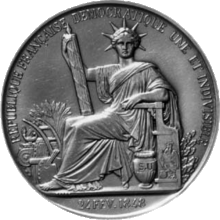Keeper of the Seals
The title Keeper of the Seals or equivalent is used in several contexts, denoting the person entitled to keep and authorize use of the Great Seal of a given country. The title may or may not be linked to a particular cabinet or ministerial office.
Canada

The official Keeper of the Great Seal of Canada is the Governor General. However, it is actually kept with the Registrar General of Canada, a title which since 1995 has been linked to the office of Minister of Industry.
Each province since 1869 has its own seal and their keepers are the provincial Lieutenant Governors.[1] As the Registrar General actually keeps the Great seal of Canada, so the provincial Great Seals are placed by the lieutenant-governors of the provinces into the keeping of the provincial Attorneys-General.
France
The French "Keeper of the Seals" (Garde des Sceaux) is a title held by the Minister of Justice. Formerly, as Keeper of the Seals of France, this title belonged to the Chancellor, the ancien régime counterpart of the minister of justice. The title is nowadays often used interchangeably with "Minister of Justice of France."
The Minister of Justice guards the Great Seal of France, dating from 1848, in his or her office, as well as the stamping press. The Seal was used in 1958 to seal the Constitution of France and has since been used to seal certain constitutional amendments.
Italy
In Italy, the Minister of Justice assumes the duties of Guardasigilli (Keeper of the Seals).
As Guardasigilli, the Minister of Justice countersigns all laws and decrees signed by the president and the decrees issued by other ministries. The Minister of Justice is also the editor of the Gazzetta Ufficiale della Repubblica Italiana, the official bulletin of the Italian Republic.
Japan
United Kingdom
Several British officials have titles connected to the keeping of seals.
- Lord Privy Seal: Keeper of the Privy Seal of England and one of the five Great Officers of State. A sinecure office used to bring a person into the British Cabinet as a Minister without Portfolio.
- Keeper of the Privy Seal of Scotland: An honor traditionally given to a Scottish Peer, vacant since 1922.
- Lord High Chancellor: Keeper of the Great Seal of the Realm. The office today is primarily concerned with the administration of the courts, and is linked by constitutional convention to the office of Secretary of State for Justice; all Justice Secretaries since the creation of the office have also been appointed Lord Chancellor. Prior to the Constitutional Reform Act 2005, the office had had substantial legislative, executive, and judicial power; the Act stripped the Lord Chancellor non-executive functions (besides sitting in Parliament when held by an MP or a Peer entitled to a seat in the Lords). The office's responsibilities had previously not only been those of the chief administrator of the court system but also of presiding officer of the House of Lords (succeeded in that capacity by the Lord Speaker) and of a judge or judge-like position on several judicial bodies.
- Keeper of the Great Seal of Scotland: An official entrusted with the Great Seal of Scotland, generally given to holders of Scotland-specific offices. Currently held ex officio by the First Minister of Scotland; the position of the First Minister takes its position in the order of precedence by virtue of his or her position as Keeper of the Great Seal. Before the Scotland Act 1998 created the office of First Minister, the position of Keeper of the Great Seal of Scotland was generally given to the Secretary of State for Scotland.
- Keeper of the Welsh Seal: An office created by the Government of Wales Act 2006 to grant the First Minister of Wales an official position for purposes of the Order of Precedence as well as other ceremonial matters. No Welsh Seal had previously existed.
- Chancellor of Cornwall: Keeper of the Great Seal. Appointed by the Duchy of Cornwall, vacant since 1867.
- Keeper of the Privy Seal of Cornwall: Appointed by the Duchy of Cornwall, vacant since 1933.
United States
The United States Secretary of State is the official keeper of the Great Seal of the United States,[2] and the seal may only be affixed to instruments as provided by law or by authorization of the President.[3] Unlike the Great Seals listed above, the Great Seal is the primary graphical emblem of the United States and is used equivalently to a coat of arms.
The seals of individual U.S. states are typically the responsibility of the State Secretary of State.
References
- ↑ http://www.ops.gov.sk.ca/Default.aspx?DN=793b8eb3-2f3a-4562-8b1d-b84c1b37e56e
- ↑ 4 U.S.C. § 42 (2006).
- ↑ See 4 U.S.C. § 42 (2006) ("Except as provided by section 2902 (a) of title 5, the [great] seal shall not be affixed to any instrument without the special warrant of the President therefor.").
